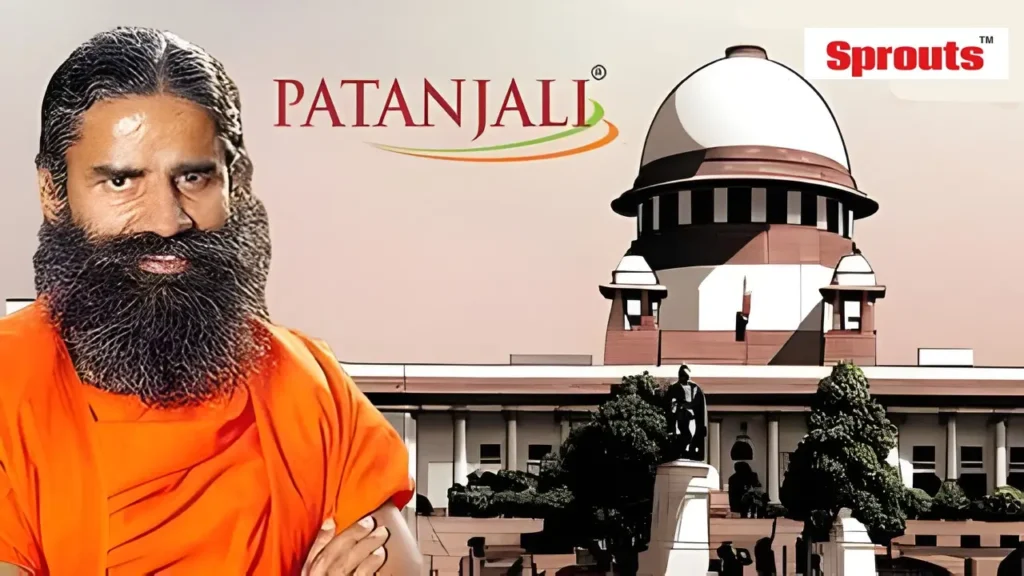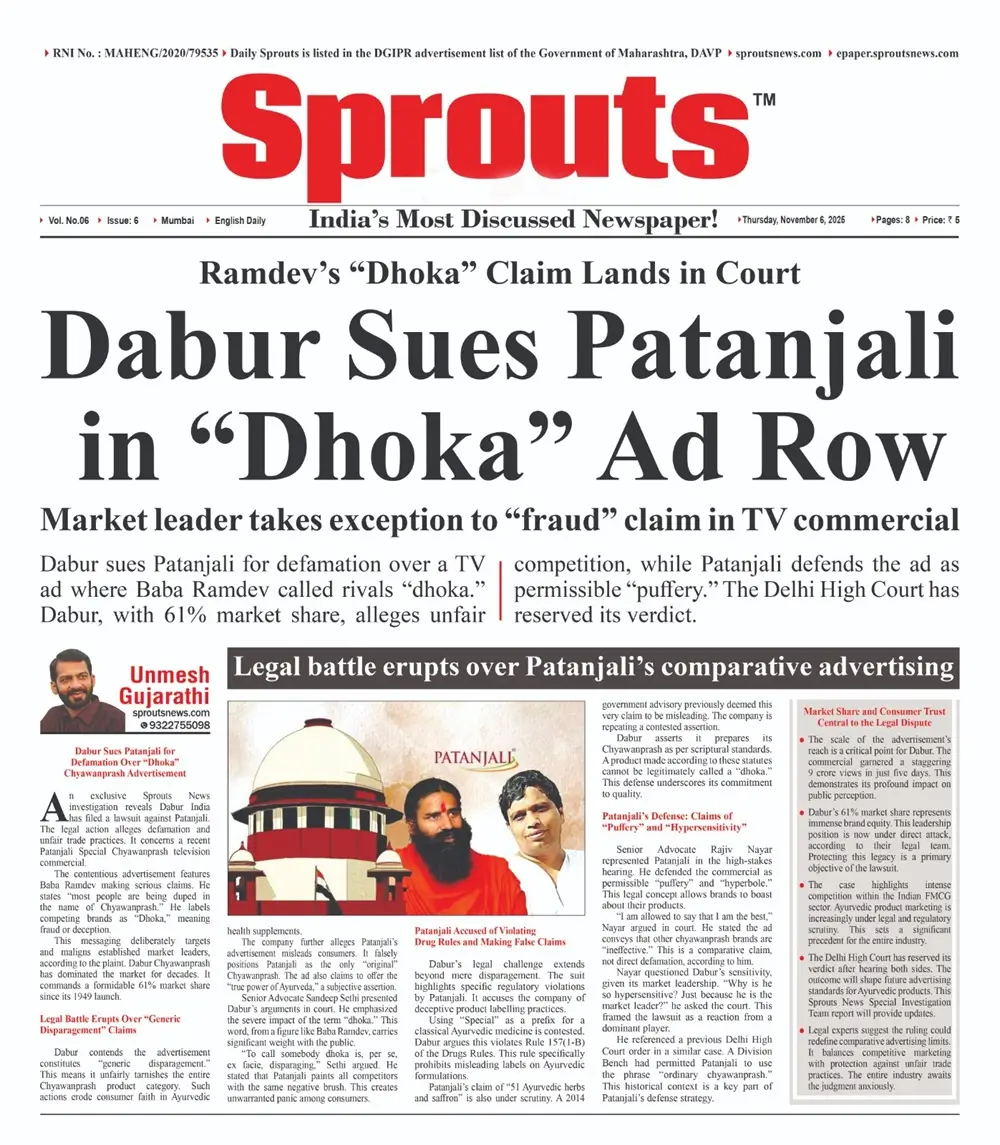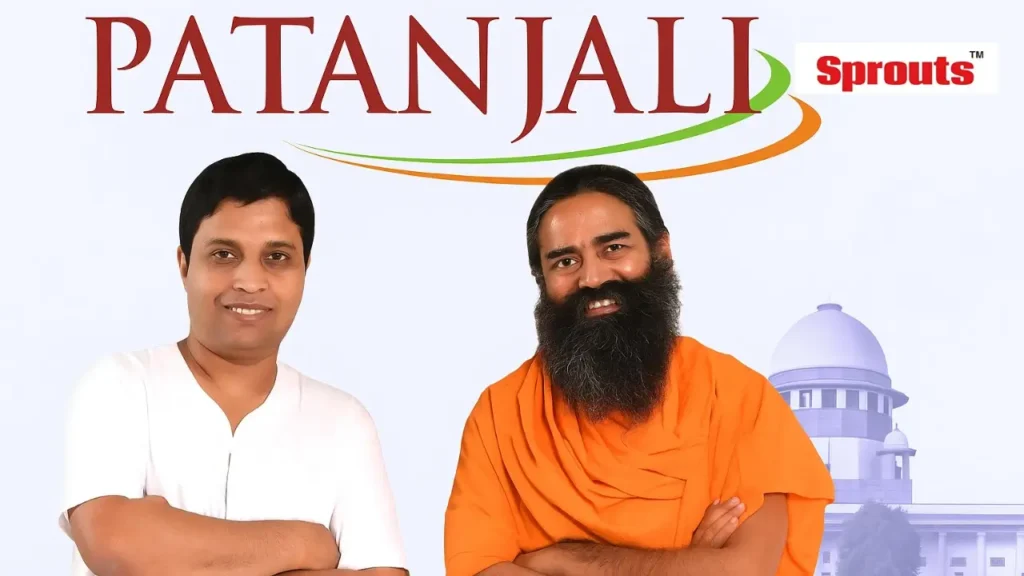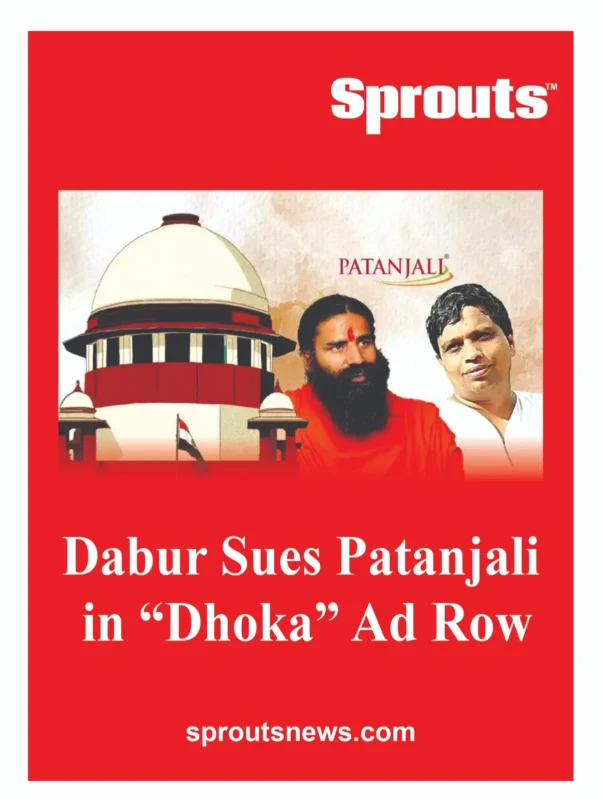Dabur Sues Patanjali for Defamation Over “Dhoka” Chyawanprash Ad
• Patanjali Accused of Violating Drug Rules in Chyawanprash Labelling
• Market Leader Dabur Fights to Protect 61% Market Share
• Consumer Trust and Market Dynamics at Stake
Dabur India Ltd has filed a defamation suit against Patanjali Ayurved over its “Dhoka” Chyawanprash advertisement featuring Baba Ramdev. The commercial allegedly labels rival brands as deceptive, directly targeting Dabur’s 61% market share in the ₹700 crore Chyawanprash sector. The case, currently before the Delhi High Court, raises concerns about unfair competition, consumer trust, and ethical advertising practices in India’s competitive FMCG landscape.
- Dabur Sues Patanjali for Defamation Over “Dhoka” Chyawanprash Ad
- • Patanjali Accused of Violating Drug Rules in Chyawanprash Labelling
- • Market Leader Dabur Fights to Protect 61% Market Share
- • Consumer Trust and Market Dynamics at Stake
- Dabur Sues Patanjali for Defamation Over “Dhoka” Chyawanprash Advertisement
- Legal Battle Erupts Over “Generic Disparagement” Claims
- Patanjali Accused of Violating Drug Rules and Making False Claims
- Patanjali’s Defense: Claims of “Puffery” and “Hypersensitivity”
- Market Share and Consumer Trust Central to the Legal Dispute
Click Here To Download the News Attachment
Dabur Sues Patanjali for Defamation Over “Dhoka” Chyawanprash Advertisement
An exclusive Sprouts News investigation reveals Dabur India has filed a lawsuit against Patanjali. The legal action alleges defamation and unfair trade practices. It concerns a recent Patanjali Special Chyawanprash television commercial.
The contentious advertisement features Baba Ramdev making serious claims. He states “most people are being duped in the name of Chyawanprash.” He labels competing brands as “Dhoka,” meaning fraud or deception.
This messaging deliberately targets and maligns established market leaders, according to the plaint. Dabur Chyawanprash has dominated the market for decades. It commands a formidable 61% market share since its 1949 launch.
Legal Battle Erupts Over “Generic Disparagement” Claims
Dabur contends the advertisement constitutes “generic disparagement.” This means it unfairly tarnishes the entire Chyawanprash product category. Such actions erode consumer faith in Ayurvedic health supplements.
The company further alleges Patanjali’s advertisement misleads consumers. It falsely positions Patanjali as the only “original” Chyawanprash. The ad also claims to offer the “true power of Ayurveda,” a subjective assertion.
Senior Advocate Sandeep Sethi presented Dabur’s arguments in court. He emphasized the severe impact of the term “dhoka.” This word, from a figure like Baba Ramdev, carries significant weight with the public.
“To call somebody dhoka is, per se, ex facie, disparaging,” Sethi argued. He stated that Patanjali paints all competitors with the same negative brush. This creates unwarranted panic among consumers.
Also Read: Aishwarya Rai Bachchan Wins ₹4.11 Crore ITAT Tax Case.
Patanjali Accused of Violating Drug Rules and Making False Claims
Dabur’s legal challenge extends beyond mere disparagement. The suit highlights specific regulatory violations by Patanjali. It accuses the company of deceptive product labelling practices.
Using “Special” as a prefix for a classical Ayurvedic medicine is contested. Dabur argues this violates Rule 157(1-B) of the Drugs Rules. This rule specifically prohibits misleading labels on Ayurvedic formulations.
Patanjali’s claim of “51 Ayurvedic herbs and saffron” is also under scrutiny. A 2014 government advisory previously deemed this very claim to be misleading. The company is repeating a contested assertion.
Dabur asserts it prepares its Chyawanprash as per scriptural standards. A product made according to these statutes cannot be legitimately called a “dhoka.” This defense underscores its commitment to quality.
Patanjali’s Defense: Claims of “Puffery” and “Hypersensitivity”
Senior Advocate Rajiv Nayar represented Patanjali in the high-stakes hearing. He defended the commercial as permissible “puffery” and “hyperbole.” This legal concept allows brands to boast about their products.
“I am allowed to say that I am the best,” Nayar argued in court. He stated the ad conveys that other chyawanprash brands are “ineffective.” This is a comparative claim, not direct defamation, according to him.
Nayar questioned Dabur’s sensitivity, given its market leadership. “Why is he so hypersensitive? Just because he is the market leader?” he asked the court. This framed the lawsuit as a reaction from a dominant player.
He referenced a previous Delhi High Court order in a similar case. A Division Bench had permitted Patanjali to use the phrase “ordinary chyawanprash.” This historical context is a key part of Patanjali’s defense strategy.
Market Share and Consumer Trust Central to the Legal Dispute
The scale of the advertisement’s reach is a critical point for Dabur. The commercial garnered a staggering 9 crore views in just five days. This demonstrates its profound impact on public perception.
Dabur’s 61% market share represents immense brand equity. This leadership position is now under direct attack, according to their legal team. Protecting this legacy is a primary objective of the lawsuit.
The case highlights intense competition within the Indian FMCG sector. Ayurvedic product marketing is increasingly under legal and regulatory scrutiny. This sets a significant precedent for the entire industry.
The Delhi High Court has reserved its verdict after hearing both sides. The outcome will shape future advertising standards for Ayurvedic products. This Sprouts News Special Investigation Team report will provide updates.
Legal experts suggest the ruling could redefine comparative advertising limits. It balances competitive marketing with protection against unfair trade practices. The entire industry awaits the judgment anxiously.




















